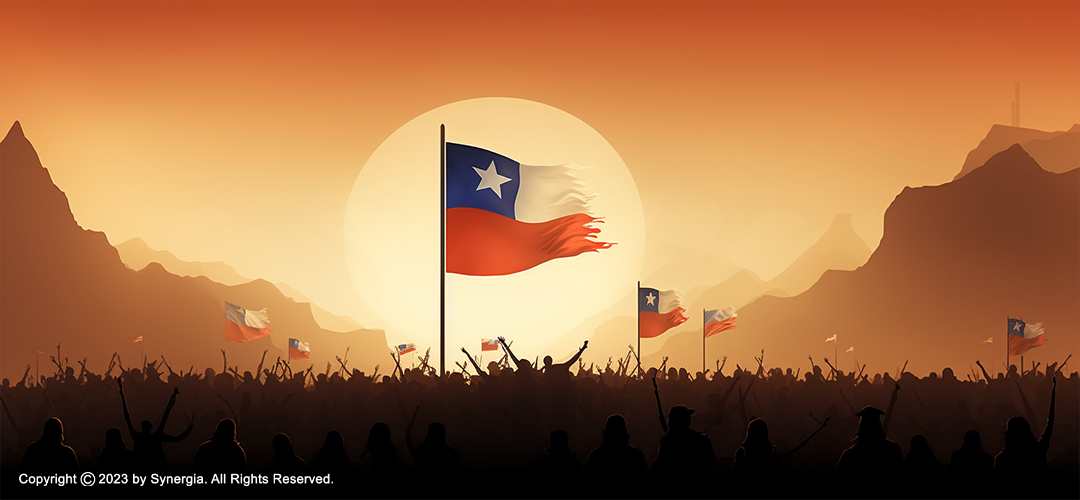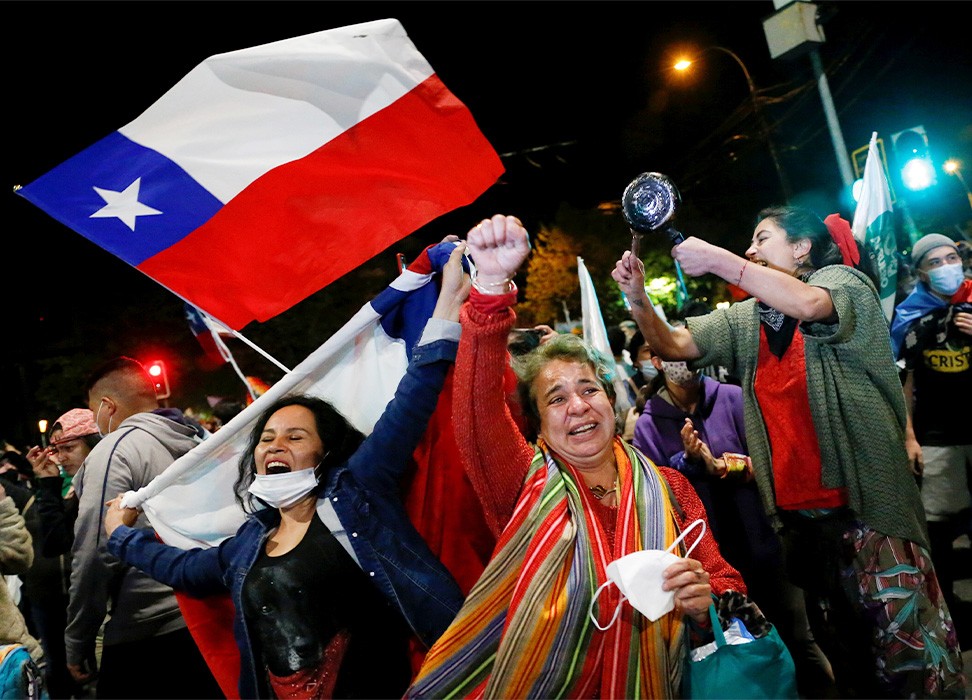Chile: Constitutional Reframing
June 3, 2023 | Expert Insights

Early in May, Chileans voted to elect a Constitutional Council to draft a new constitution to supersede the one left by the 1980 Pinochet dictatorship. The Constitutional Council will produce a preliminary draft crafted by a group of 24 experts chosen by Congress into a document that voters will approve or reject in a December referendum.
Chilean right-wing parties attained a three-fifths majority of constitutional council members, allowing them to fully draft a new constitution and removing the left's veto power. For the incumbent President, Gabriel Boric, this was yet another setback in his drive to give the country a more progressive constitution. With the right wing in the majority in the council, Boris may find it difficult, if not impossible, to bring in the reforms that he had envisioned.
Background
As one of Latin America's more prosperous and stable economies, events in Chile have a ripple effect on the rest of the continent. Last year around the same time, amongst much fanfare, 36-year-old Mr Gabriel Boric of the Social Convergence party (the youngest ever president) was installed as president after a convincing 56 per cent majority over his rival in a keenly contested and contentious election. Two years of intense instability preceded his election as the country was torn apart by mass protests with people demanding better pensions, education and pro-poor economic reforms. Like most other countries in pursuit of free-market norms, Chile, despite its impressive growth rates in the past, had witnessed a growing gap between the rich and the poor, with a mere 1 per cent owning 25 per cent of the national wealth. The pandemic further exacerbated the situation.
In 2019, protests were sparked by the original Constitution, credited with fostering economic growth but criticized for causing inequality. Under public pressure, the previous President, Sebastian Pinera, held a referendum on changing the Constitution. The Chileans voted overwhelmingly for a new constitution that is now being drafted. Mr Boric was seen by the common man as a messiah, holding out the proverbial promise of rescuing the masses from poverty. He is known for his sharp criticism of the traditional centre-right and centre-left parties, which had taken turns ruling the country since the brutal Pinochet dictatorship.
The new Constitution would recognize Chile as a plurinational, intercultural, regional, and ecological state and grant Indigenous people official recognition and autonomy. Additionally, it would establish the rights to social services, environmental protection, gender equality, and abortion.
The fear is that Chile's new Constitution may end up resembling the current text, which dates back to the Augusto Pinochet dictatorship - but without his name - after the political right assumed control of the redrafting process, which may result in a conservative revision.
The political climate has changed since the disastrous first attempt, with economic and security crises influencing public opinion. Boric's approval rating has declined despite his previous assurances, and the right-wing has gained ground. The right may need to make concessions to appease voters, and Boric's loss has undermined his leadership position. Progressive parties faced low support and a large number of null and blank ballots, indicating that the left must adapt its strategy.
Chile has been hailed as a Latin American economic powerhouse and success tale in recent decades. However, the extreme neoliberal policies implemented by General Pinochet have had an enduring impact on the economy and politics of the country. Pinochet's privatization agenda, trade liberalization, and deregulatory policies aimed to promote economic development, but they perpetuated inequality and widened social divisions.
Chile is the only country in the world that has privatized virtually all its water resources. The 1980 Constitution enshrined the "right" to private ownership of water, which has resulted in water scarcity, droughts, and corporate control of resources that have disproportionately impacted communities, small producers, and cities.
The income gap in Chile is substantially greater than the OECD average, exceeding 65 per cent. Significant health disparities exist between women in disadvantaged areas and those in more affluent areas of the same city, with women in disadvantaged areas living approximately 18 years less than those in more affluent areas. In addition, the healthcare system is divided between a well-funded private system that is only accessible to the wealthy and an underfunded public system that serves the majority.

Analysis
When a country embarks on rewriting its Constitution, it faces numerous challenges. The new document must possess a level of durability and adaptability, speaking to both the present and the future and capturing a collective sense of community while empowering individuals.
In this context, Chile's redrafting of its Constitution represents a refreshing approach to constitutionalism for a modern nation, particularly in a post-colonial world where opportunities to study the construction of new constitutions are scarce. It offers an excellent opportunity to review the need for reform, explore methods of change, and consider the types of rights that should be acknowledged.
The visionary aspect of Chile's response to social upheaval lies in its commitment to constitutional reform as a means to address inequality rather than resorting solely to populist changes in economic policies. By treating inequality as a constitutional issue, other neoliberal problems such as wealth concentration, a shrinking middle class, and limited social mobility are also elevated as threats to liberal constitutionalism.
Seeking a constitutional remedy for inequality challenges the privileged relationship between the economically and politically powerful and their control over socioeconomic processes, in contrast to a policy-based approach. Interestingly, the Chilean experience suggests that the best way to protect and enhance democracy is by re-establishing the social welfare state.
Professor Roberto Gargarella, from the Universities of Buenos Aires and Torcuato di Tella, offers a unique perspective on the process. According to him, the constitutional initiative ticked many boxes but ultimately resulted in delegates who were too disconnected from the people they aimed to represent, despite emerging from a process of significant social mobilization. This argument carries weight, considering that the majority of delegates in the Constitutional Convention were independent and had limited party affiliations. They may have struggled to effectively communicate their vision for the new Constitution and failed to convince the public that they truly represented the communities they were elected to serve.
The decision to embark on the process of drafting a new constitution came at a time when Chile's citizens and governmental institutions were on the brink of collapse. The nation faced a stagnant economy, rising violence, organized crime, and an influx of migrants from the region, adding to the prevailing sense of unease. Consequently, there is a strong desire for stability and short-term and long-term solutions to address the impending challenges.
The Constituent Assembly must learn from past mistakes and draft a constitution that tackles societal inequalities while addressing economic stagnation. To create a comprehensive and effective constitution, it is essential to strike a delicate balance between addressing immediate concerns and designing enduring solutions that will shape Chile's future. The process must actively involve the citizens and ensure their voices are heard and incorporated into the final document. It should draw on the lessons learned from other constitutional reforms worldwide while taking into account Chile's unique historical and sociopolitical context.
Assessment
- The constitutional process presents an opportunity to build consensus across political divides and foster a sense of national unity. Political leaders must set aside partisan interests and work towards a shared vision for a more just and equitable society. By engaging in constructive dialogue and compromising on key issues, Chile can lay the groundwork for a constitution that reflects the aspirations of its diverse population.
- The redrafting of Chile's Constitution is a critical juncture in the nation's history, offering a chance to address longstanding grievances and forge a path towards a more inclusive and prosperous future.
- It is an opportunity for Chile to demonstrate its commitment to democratic principles and the well-being of its citizens. By approaching the process with openness, transparency, and a genuine desire for change, Chile can emerge with a constitution that truly represents the people.








Comments